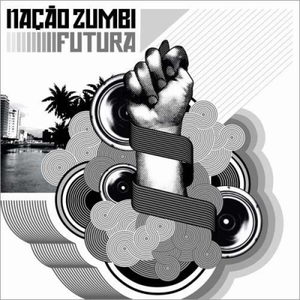Na Hora de Ir
Nação Zumbi Lyrics
Jump to: Overall Meaning ↴ Line by Line Meaning ↴
Voltou na hora de ir
O tombo jà denunciado no susto
Aumenta o grito
A conversa suspensa no ar
Lançado o roubo
Foi na prova sem suspeito
A olho nu
Foi-se o ladrão
A fome não vai rir por tão pouco
E a fatura embolsando
O bocado que der pra levar
Famintos pelo que vier na graça do vento
Rendendo a tempo
Atè perder é sò ganhar
Chegou na hora de voltar
Voltou na hora de ir
Nem sempre tudo ao alcance do bolso
A sirene reclama e inflama
A pobre arma na mão
Ligando a carne na trincheira
Engrossa o sangue
Fogo no teto
É melhor ficar no chão
Com o nò na garganta
E a imagem indo embora
Da boca pra fora
Já de segunda mão...
Chegou na hora de voltar
Voltou na hora de ir
The song "Na Hora de Ir" by Nação Zumbi, a Brazilian rock band, talks about the moment of transition, where what once had to happen reaches its conclusion and encapsulates a sense of departure that characterizes this moment. The song refers to the feeling of closing a chapter and starting a new one, letting go of things and moving forward. The lyrics are reflective and filled with metaphors, where each verse describes a different scenario where the character is faced with this moment of transition.
The first verse talks about a thief who was caught stealing, and how he will not be able to satisfy his hunger with his loot. The phrase "Á queima-roupa" is often used in Brazilian slang to describe a situation when someone is caught red-handed. The second verse talks about the feeling of not having enough money to buy everything we want, and how the poor are often the ones left with no choice but to fight for their survival. The lyric "Ligando a carne na trincheira" can be interpreted as this fight for survival, where the poor have to resort to violence to survive.
Overall, the song is about the moment of change, where one must leave something behind and enter into something new. The lyrics reflect on different aspects of life, from the trivial to the more significant, where the same feeling of departure and the unknown is felt.
Line by Line Meaning
Chegou na hora de voltar
It's time to go back
Voltou na hora de ir
Returning in time to leave
O tombo jà denunciado no susto
The fall already foreshadowed by the shock
Aumenta o grito
The scream grows louder
A conversa suspensa no ar
The conversation hanging in the air
Lançado o roubo
The theft committed
Foi na prova sem suspeito
Done without any suspicion
Á qeima-roupa
At point blank range
A olho nu
Visible to the naked eye
Foi-se o ladrão
The thief has gone
A fome não vai rir por tão pouco
Hunger won't be satisfied so easily
E a fatura embolsando
And the bill being pocketed
O bocado que der pra levar
Taking whatever can be taken
Famintos pelo que vier na graça do vento
Hungry for whatever comes their way
Rendendo a tempo
Surrendering in time
Atè perder é sò ganhar
Even in defeat, there's something to gain
Nem sempre tudo ao alcance do bolso
Not everything is within reach financially
A sirene reclama e inflama
The siren wails and incites
A pobre arma na mão
The poor have a weapon in hand
Ligando a carne na trincheira
Connecting the flesh in the trenches
Engrossa o sangue
Thickens the blood
Fogo no teto
Fire on the roof
É melhor ficar no chão
It's better to stay on the ground
Com o nò na garganta
With a knot in the throat
E a imagem indo embora
And the image fading away
Da boca pra fora
Just talk, no action
Já de segunda mão...
Already secondhand...
Contributed by Noah C. Suggest a correction in the comments below.
